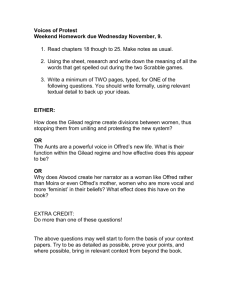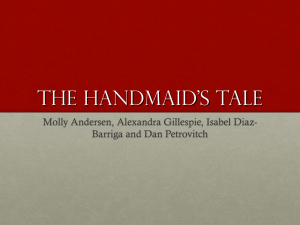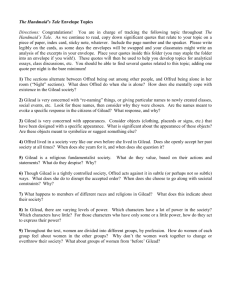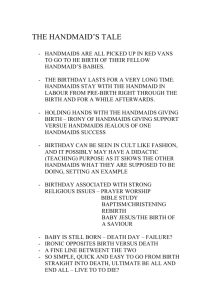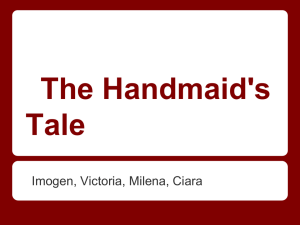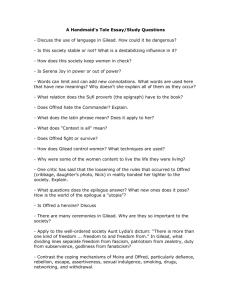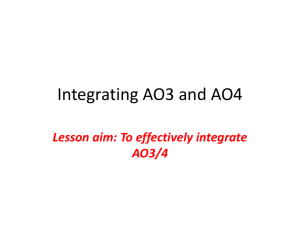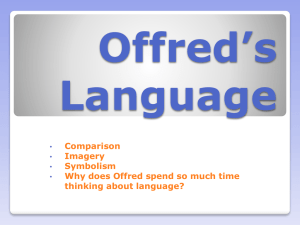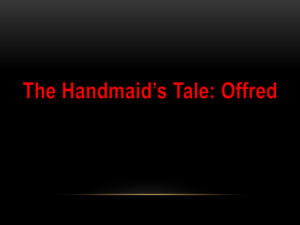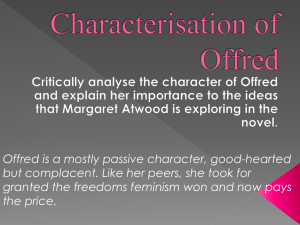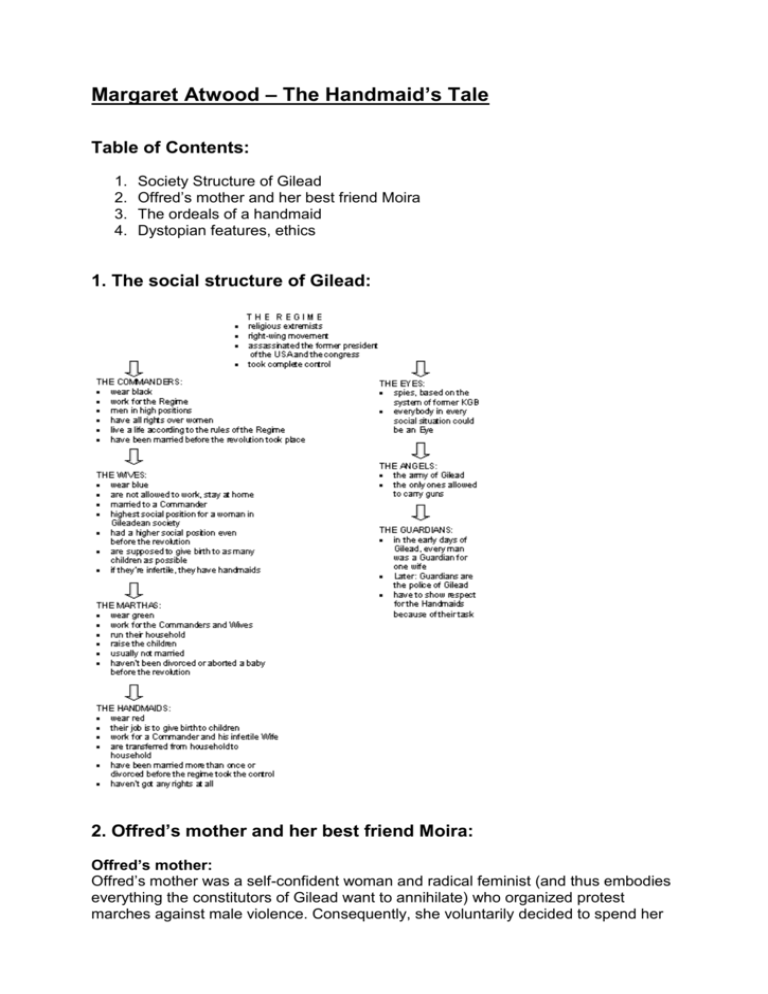
Margaret Atwood – The Handmaid’s Tale
Table of Contents:
1.
2.
3.
4.
Society Structure of Gilead
Offred’s mother and her best friend Moira
The ordeals of a handmaid
Dystopian features, ethics
1. The social structure of Gilead:
2. Offred’s mother and her best friend Moira:
Offred’s mother:
Offred’s mother was a self-confident woman and radical feminist (and thus embodies
everything the constitutors of Gilead want to annihilate) who organized protest
marches against male violence. Consequently, she voluntarily decided to spend her
life without a man/husband (“a man is just a woman’s strategy for making other
women”, p. 131 l. 1) and stuck to her position when she gave birth to Offred at the
age of 37.
Mother-daughter relationship:
Her daughter was a wanted child, even though her mother did not get any support
because Offred could have had birth defects due to her mother’s age.
Their relationship has never been easy: her mother wanted Offred to live her life in
the same manner as she lives hers (“[My mother] expected me to vindicate my life for
her”, p. 132 l. 6). She also felt Offred did not adequately appreciate the feminists’
sacrifices to help the next generation of women and in addition she often argued with
Luke. Moreover, Offred’s mother’s alcohol problem still worsened their arguments.
Although she was a rather unpleasant person (“the kind of old woman who won’t let
anyone butt in front of her in a supermarket line”, p. 130 l. 32), she had a soft side,
too: sometimes she cried out of loneliness (“And I had friends, I was a lucky one, but
I was lonely anyway”, p. 132 l. 32). We might assume that in spite of her convictions
she longed for a man at her side to love and support her.
On the whole, despite their quarrels, Offred loved her mother (“I admired my mother
in some ways although things between us were never easy”) and wishes she could
have her back, fights and all.
Offred’s best friend Moira:
Moira is a lesbian handmaid and Offred’s closest friend. They meet secretly in the
toilets to talk to each other. At first she is a very self-confident, rebellious character
who does not accept her situation and therefore tries to escape twice: the first time
she fakes illness and is thus taken to hospital, but her pretence is detected. The
second time she apparently gets away successfully: she tells Aunt Elizabeth that the
toilet is overflowing and then, when Elizabeth comes to fix it, threatens her with a
metal object – in this way Moira gets the aunt’s clothes and is able to flee from the
Red Center. Her actual plan is to cross the border to Canada but she merely
disappears for nine months. Moira is then caught and becomes a prostitute at
“Jezebel’s”. Her entire attitude changes because she no longer has the strength to
resist the totalitarian system that has eventually found a way to silence her. Moira
prefers working as a “sex servant” to the miserable life in the colonies which basically
means nothing but suffering and death.
Function of Moira’s story (treatment of strong-minded women):
Moira’s story illustrates Margaret Atwood’s intention to criticise fundamentalist,
religious movements as well as the dangers of an authoritarian society to the
individual.
Moira’s tragic fate (ending up at Jezebel’s) and her apparent acceptance of the
situation form a deep contrast with her initially rebellious attitude:
At the beginning her mere presence at the “Red Centre” causes her best friend
Offred to feel safer and more confident because of her strong-minded character. Her
absolute determination to escape and her role as a glorious rebel (she symbolises
resistance and defiance) in the dangerous world of Gilead let her lift Offred’s spirits.
After her successful attempt to flee (2nd attempt) she remains the reason for Offred’s
hope as some kind of light at the end of the tunnel, even if she does not know
whether her friend could finally manage to leave the state. But later on, when Offred
encounters her at Jezebel’s and has to face the truth that Moira has turned into a
drug-addicted whore who is thoroughly broken; her heroic image is eventually
destroyed, just as Offred’s last aspirations to escape.
3. The ordeals of a handmaid:
Feeling like a prize pig:
Although she is “washed, brushed and fed” (l. 19) before the ceremony and
everything for her physical needs is done, Offred does not feel comfortable, not in the
least respected or appreciated at any time. Ironically it is at that point of highest
attention (care) by the system that she is aware of her true value in it. Her only
purpose of living is to give birth to the offspring of Gilead, thus she simply finds
emptiness in her, for there is no other reason for her existence.
The comparison with the prize pig fits pretty well to her own situation because in both
cases only the physical condition is important for the “owner” and nothing else – she
does not even need to have a proper name.
But we should not forget that she is still a human being and (in contrast to a prize pig)
seriously knows her own status in the society of Gilead and has to cope with it. A
prize pig cannot feel the emptiness Offred has to endure or the pain about the loss of
her little daughter and her husband. When she identifies herself as an instrument of
the regime, and therefore her descriptions of “the long parentheses of nothing” (ll. 2,
3) are sometimes much more terrifying than violent methods of oppression.
Offred – a mistress?
A mistress is a man’s long term sexual partner and companion. In history wealthy
men “kept” mistresses for their sexual pleasure but this is of course obsolete and no
longer tolerated. Today the term mistress refers to the companion of a man who is
married to another woman. Their relationship is more than merely an affair but
nevertheless they do not live together openly. Since divorce has become more
socially acceptable, men can easier divorce their wives and hence marry the women
who, in former times, would have been their mistresses.
To some extent Offred indeed resembles a mistress. She secretively meets the
commander so that neither his wife nor anyone else, except for Nick, takes notice.
She is his conversation partner whom he needs so desperately and therefore she
betters his dead life – like a mistress. Beyond that Offred benefits from their
relationship, which is quite typical of a mistress, by receiving goods which are
forbidden to her (e.g. hand lotion).
On the other hand Offred does not satisfy his sexual desire, not even at the
ceremony, because their sex remains impersonal due to her lack of true feelings for
him. Moreover we must question if Offred can possibly be called a mistress since she
does not have a choice, she is forced to accompany the Commander: hence the term
“slave” is likely to be more appropriate.
Birth Day (giving away one’s child):
In Gilead pregnancy has become such a dramatically rare event that there is a
festivity just for childbirth, the so-called Birth Day.
At Ofwarren’s all the handmaids, several wives and a few aunts, who supervise the
whole procedure, watch Janine (Ofwarren) giving birth to a child – she and Warren’s
wife sit in a so-called birthing stool together, the latter above Janine as if she was
pregnant. Doctors are not permitted to interfere since the birth has to be as natural as
possible.
In order to support the pregnant handmaid the fellow handmaids chant “breathe”,
“hold” and “expel” in a kind of trance. They feel and identify so much with their
pregnant fellow sufferer they even have “slight pains” (p. 134) as well. The ritual
takes so much of the Handmaids that “[their] backs and bellies hurt from the strain”
(p. 135) but at the very moment the child is being born they experience a strong
feeling of unity – “[they] are with her, [they] are the same as her” (p. 135).
Directly after the child is born it is taken away from her and is ceremoniously put into
the wife’s arms. The handmaids, with the intent to save her the pain, stand between
Janine and the wives so that she does not need to see them. Now Ofwarren’s only
remaining job is to nurse the baby for a few months.
The handmaids feel jubilant and victorious (p. 136), some even cry: Janine achieved
what matters the most (almost solely) for a woman in Gilead, she successfully gave
birth to a seemingly healthy baby.
The handmaids’ reaction suggests how much the totalitarian system has manipulated
them and especially their attitude towards womanhood: they define it exclusively by
bearing children. Every other aspect of womanhood or a proper identity has been
taken away from them, for they neither have a job – apart from getting pregnant – nor
a husband/lover (and sex whenever they want), nor a family. But appallingly they
have not only accepted the Gileadean approach to womanhood but internalized it as
well.
Ofglen’s position within the society of Gilead (example of another handmaid):
Ofglen’s position is signalled by her red clothes: just like Offred, she is a handmaid
and hence part of the basis of the Gileadean system. By means of brainwashing, the
system prepares them for their new duties: bearing children for the commanders and
their wives, but they have to achieve that within three attempts, otherwise they are
taken to the colonies.
A comparison between Ofglen’s attitude towards her situation with that of the
narrator, Offred:
The two handmaids’ attitudes differ profoundly. Offred realizes herself that she
already is too indoctrinated by the Gileadean government to effect meaningful
change. Unlike real adversaries, she simply tries to survive during this period of terror
and sometimes deceives the omnipresent controls in small matters to salve
consciences (for instance stealing butter or her affair with Nick). Furthermore Offred
does not share information she gets from the Commander with opponents of the
totalitarian state - her fear is much greater than her will to tear down the injustice.
By contrast, Ofglen is determined to fight the system and has the courage to really
act (e.g. as a member of “Mayday”). When she is found out, she even commits
suicide rather than face torture and reveal the names of other “Mayday” members.
4. Dystopian features, ethics:
Oppression of strong individuals:
The sudden insight into Moira’s deep fall creates an unnerving and terrifying effect for
the reader which points out how cruelly and ruthlessly the regime haunts its enemies
until they finally defeat them, so that even the strongest characters cannot persist. It
makes the reader feel the helplessness towards this oppressive system and
represents with its contained warning a typical feature of dystopian novels. In the end
Moira’s breakdown under the system increases the reader’s feeling of
powerlessness, as it represents a victory of fatalism over one’s own free decisions.
Typical features of dystopian novels that appear in the Handmaid’s Tale:
Like in Orwell’s 1984, the surroundings in The Handmaid’s Tale seem strange to the
reader right from the beginning – both stories set in after a vast catastrophe:
irresponsible handling of toxic waste, chemical warfare and respectively of atomic
weapons. Such disruptions often represent the background for dystopian novels and
support the alarming atmosphere at the beginning.
Due to its feminist tendency, but not exclusively because of that, the author put much
emphasis on the personal ordeals Offred has to endure, which is nevertheless typical
of criticism of totalitarian societies. For this intention it is basically important to stress
the powerlessness of these protagonists. Illustrations of the absolute power of the
system and its leaders can be found in 1984 as well as in The Handmaid’s Tale.
Consequentially, the reader must feel sympathy towards Offred / Winston, the
oppressed victims, and could even feel hatred and anger because of the injustice
that takes place in the plots.
Pornography, abortion, pollution, diseases
Every single element, be it pornography, abortion, pollution or diseases led to the
creation of Gilead.
Pollution, especially the nuclear catastrophe, and diseases caused environmental
problems and low birth rates which threatened the further existence of humankind.
This is one reason why many people did not bother to work against the
revolutionaries determinedly to that they could succeed.
Beyond that the prevalence of rape and pornography in the pre-Gilead world justified
to the founders their establishment of the new order. Women were thought of as sex
objects – pornographic films were the best example of this degradation.
The Gileadean Regime claims that women are better protected in Gilead and
consequently safe from violence. This is paradoxical though, since sexual violence
appears in the central event of the new system, the Ceremony: a handmaid is forced
to have sex with her respective Commander.

